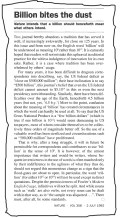 Back in the day, we Brits had big billions. A billion was a million millions. Obviously, the “bi” doubling up the “illion” from million. What else would it be? Well…of course…the Americans wanted to talk bigger still and so made their billion a mere 1000 million. Back then, it was hard to be a millionaire (these days, you just go on TV), but becoming a billionaire was not unthinkable and there are more and more multi-1000-millionaires around these days. Given that financial institutions throw billions around like it’s nobody’s business and national debts amount to trillions (just millions of millions as opposed to millions of millions of millions) and there are hints that quadrillions will soon hit tabloid financial pages.
Back in the day, we Brits had big billions. A billion was a million millions. Obviously, the “bi” doubling up the “illion” from million. What else would it be? Well…of course…the Americans wanted to talk bigger still and so made their billion a mere 1000 million. Back then, it was hard to be a millionaire (these days, you just go on TV), but becoming a billionaire was not unthinkable and there are more and more multi-1000-millionaires around these days. Given that financial institutions throw billions around like it’s nobody’s business and national debts amount to trillions (just millions of millions as opposed to millions of millions of millions) and there are hints that quadrillions will soon hit tabloid financial pages.
While musing on the true nature of and its reduced immensity I recalled the journal Nature finally bowing to its American authors and even those beyond the US who were increasingly equating the billion with the depreciated 1000-million. I asked Ruth Francis in the press office if she could dig out the announcement. It took her a couple of days and presumably no little door slamming and the clashing together of editorial heads, but eventually the pre-electronic archives of the journal turned up this little gem. I suspect it was written by the inimitable Henry Gee, but cannot be sure. It’s so brilliantly written, so snarky, yet polite. Nature Chemistry’s Stuart Cantrill just messaged me to suggest it may well have been penned by then Editor John Maddox…
In the issue of Nature dated 2nd July 1992, the journal stated: “…from now on, the English word “billion” will be understood as meaning 10^9 rather than 10^12. It is earnestly hoped that readers will not mistake this upheaval in editorial practice for the witless indulgence of innovation for its own sake. Rather it is a case where tradition [of close to 125 years] has been overwhelmed by others’ usage.”
Ruth affirmed Sciencebase that Nature, like The Economist, defines 1 billion = 1,000 million, 1 trillion = 1,000 billion. “We’re not aware of ever having to use quadrillion, but it would 1,000 trillion,” she told me. With debts mount around the world, that day will come. My late father-in-law who was otherwise financially rather estute was, I am certain, more concerned about the banking crisis and envious of the world’s billionaires by three orders of magnitude than he ought to have been.
As a British child watching Carl Sagan’s classic Cosmos, I was awed to the tenth to the 12th degree to imagine those billions upon billions of stars actually being millions of billions upon billions…
![]() Anon (1992). Billion bites the dust Nature, 358 (6381), 2-2 DOI: 10.1038/358002b0
Anon (1992). Billion bites the dust Nature, 358 (6381), 2-2 DOI: 10.1038/358002b0